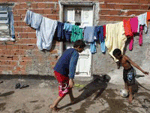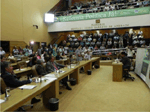Brazil
Published on Wed, 2016-08-17 20:11
The coup currently on course in Brazil, with great chance of succeeding in the next 30 days, has many faces and short- and long-term effects for the Brazilian population. In little over 100 days of interim government, the politically conservative and economically liberal agenda is being rapidly designed and raising fear among the most vulnerable sectors of the society, such as workers and retirees. It is now clear that the nebulous process of impeachment endangers historical achievements and the very capacity of the Brazilian state to deal with its historical ills. Regarding workers and retirees, sweeping reforms of the labor and welfare systems that would produce significant regressions on their rights are already well under way to implementation, without any concern about the legitimacy or the screen of the ballot boxes. Indeed, many take for granted their approval if the impeachment process goes ahead in the Federal Senate. |
Published on Fri, 2015-04-17 09:20
Between 2008 and 2014, the Banco Nacional de Desenvolvimento Econômico e Social (BNDES), Brazil’s leading development finance institution, disbursed more than Brazilian Reals 654 billion. Of that total, approximately Brazilian Reals 289 billion (44 per cent) was earmarked for infrastructure, logistics and energy, considered strategic areas underpinning Brazil’s chosen model of economic growth, which rests on large-scale exports of agricultural and mining commodities. The BNDES holds a larger portfolio than multilateral institutions including the World Bank and the Inter-American Development Bank. What is more, in recent years, it has taken on a leading role – much to the benefit of major Brazilian corporations – as one of the main funders of infrastructure projects in Latin America |
Published on Thu, 2014-11-13 19:45
Dilma Rousseff, re-elected president of Brazil, "does not have more options than to get closer to the social movements and to the population during her next term”, says the philosopher Jose Antonio Moroni, member of the Board of directors of the Institute of Socioeconomic Studies (INESC). “One option is that Dilma is going to govern with people in the streets supporting her steps in the reform process that the whole world wants or she is going to have people against her", Moroni argues. Dilma´s first government was „extremely technocratic ", says Moroni, with only few links to society. If Dilma repeats that strategy she will face a difficult time with the current Congress. |
|
Brazil is a mixture of great prosperity and terrible deprivation. If it is administered in the right way its potential for development is almost unlimited, but the inequalities in society are so vast that it seems they will never be overcome. For the country to achieve sustainable development it will have to tackle many obstacles, and the biggest of these, which affects not just Brazil but the whole world, is the indiscriminate destruction of the Amazon jungle, mainly through logging. This large scale attack, which is being promoted and driven by interest groups of landowners, livestock enterprises and international companies, and facilitated by very poor environmental protection policies and rampant corruption, is well on the way to destroying “the lungs of the world”.
|
Published on Thu, 2011-09-22 13:04
Sources: Transparency International, Financial Task Force, HumanRights.gov, Inesc
A group of government and civil society organizations from all over the planet, among them the Instituto de Estudos Socioeconômicos (Inesc, focal point of Social Watch in Brazil), launched this Wednesday in New York the Open Government Partnership (OGP), a multilateral initiative that aims to promote transparency, fight corruption, strengthen accountability and empower citizens. |
Published on Tue, 2011-09-20 12:28
Source: Eurostep As part of the so called BRICS countries (along with China, India, Russia and South Africa), Brazil has established itself as one of today’s most important emerging economic powers. The country has not only become increasingly involved in giving aid to African countries but is also expected to provide help to the European Union’s (EU) indebted member states, as a means to overcome the current financial crisis, reported Eurostep based on news published by several media outlets. |
Published on Tue, 2011-08-30 07:17
Source: Inesc Thousands of people in favelas (shanty towns) in Rio de Janeiro are being evicted from their homes as Brazil prepares for the 2016 Olympic Games, and the same is happening in other cities that will host matches during the 2014 World Cup. According to the lawyer Roberto Benedito Barbosa, an activist in the Sao Paulo Union of Housing Movements (UMM), this is being done "to move the poor farther and farther away from rich neighbourhoods”. This matter has already reached the United Nations where it is giving cause for concern. |
Published on Fri, 2011-08-19 08:08
Sources: INESC, Platform to Reform the Political System, Correio do Brasil. Last Tuesday a coalition of 30 Brazilian civil society organizations began collecting signatures for their Popular Initiative Proposal for Political Reform. If this project is successful it will facilitate citizen participation and monitoring in government matters, and also combat corruption in the organs of the State. |
Published on Wed, 2011-08-10 07:49
Source: Ibase The Brazilian Institute of Social and Economic Analysis (Ibase), which is dedicated to strengthening democracy and affirming active citizenship, is one of the focal points of Social Watch in this Latin American country. It celebrated its 30th anniversary on Tuesday this week, and up to the middle of September it will be holding a series of commemorative activities opened by ex-President Luiz Inácio Lula da Silva. |
SUSCRIBE TO OUR NEWSLETTER









